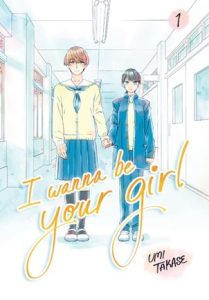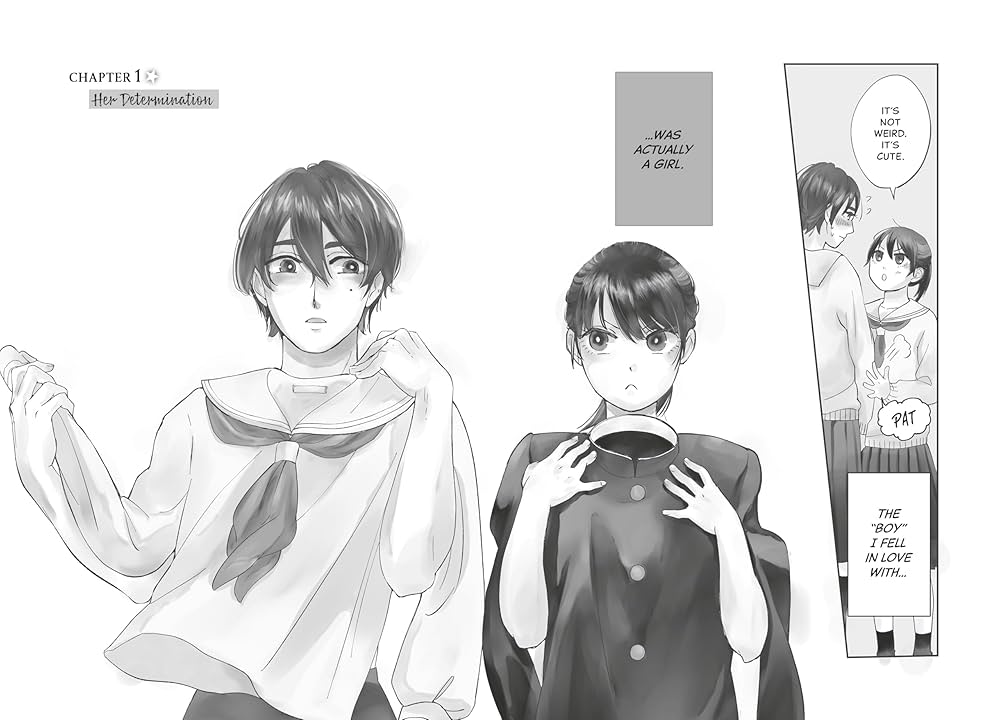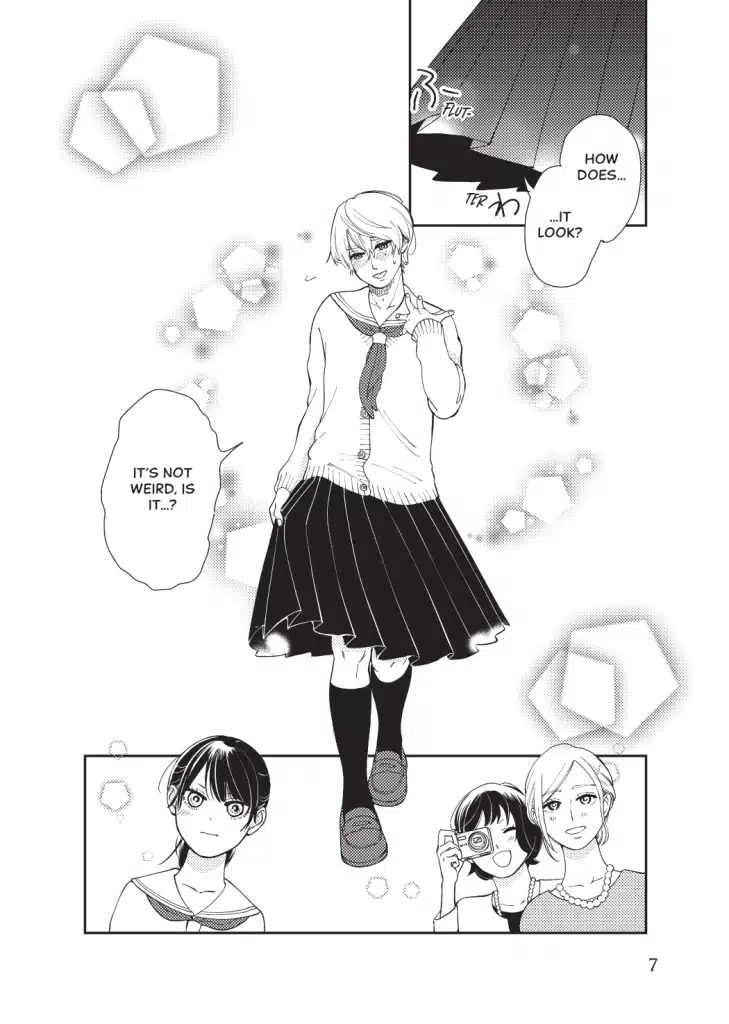

I Wanna Be Your Girl
Writer: Umi Takase
Artist: Umi Takase
Designers: Jules Buckley and Sylvia Bi
Editors: Jordan Blanco, Patricia Callahan, and Katy Miller
Publisher: Ink Pop
Publication Date: July 1, 2025
Rating: 12+
Genre: Teen and YA fiction; slice-of-life/romance story
Umi Takase‘s debut manga series, I Wanna Be Your Girl, first launched on the GANMA! manga app before being picked up by Penguin Random House‘s new manga imprint, Ink Pop. It was the imprint’s debut manga, and with it, Ink Pop made a statement: it is committed to telling diverse stories. Even though I assume that most of PRH’s decisions about what it should choose as Ink Pop’s first manga series happened before the November 2024 election results were in, the imprint was by no means obligated to stick with those initial choices—and if consumers learned anything from ABC‘s decision to indefinitely suspend Jimmy Kimmel‘s late-night talk show after a single monologue that MAGA and the Trump Administration found offensive, it’s that there is something corporations fear more than sunk costs: the threat of government overreach into its day-to-day operations and affairs.
In this day and age, where pink money—a term that refers to the LGBTQIA+ community’s purchasing power—is being treated as a fringe market, instead of as the fastest-growing minority group in terms of purchasing power, it’s made me re-examine my beliefs about the role that corporations play in the queer community’s quest equality, in my community’s quest for equality. While there are a lot of valid criticisms of rainbow capitalism, organizational corporate support—which, under theories of organizational behavior, is not merely a summation of individual actors’ choices within a corporation —of these practices wouldn’t be under attack by MAGA and the Trump Administration if they didn’t matter.


Even if motivated by corporate greed, it turns out rainbow capitalism plays a vital role in the visibility of the queer community—and visibility leads to acceptance. While this seems to be an unpopular belief in many queer spaces, I think it’s a belief that may be worth challenging. Not only do studies show the impact that consumer products have on bringing minority cultures into the mainstream, but the mere fact that conservatives have waged an ongoing war on companies that market to the queer community is proof that rainbow capitalism plays a role in how the queer community is perceived.
I hope my sentiments above didn’t seem like pointless philosophical ramblings to you, our reader. For me, I felt it was important to say, especially in a time when my very existence is political as a transgender and genderqueer person and critic. More importantly, it’s also why the decision to stick with Takase’s work as Ink Pop’s debut title means more than what the editorial team at one of the Big Five’s newest imprints could have possibly imagined when they chose to launch with a queer love story.
I Wanna Be Your Girl is a high school slice-of-life/romance story about gender identity, first love, friendship and self-acceptance. It follows two childhood best friends, Akira and Hime. Right before the two friends start high school, Akira decides to live authentically as herself, expressing her identity by opting for the feminine version of their school’s uniform. While Hime has known that her best friend is a girl since they were 12, it isn’t until the two enter high school that Hime’s notions of her own identity are challenged. Hime, who has been protecting and supporting Akira, now has to figure out what this means: for Akira’s transition, for their friendship, and for her own feelings, which are romantic, protective, and complicated.


From what the reader can see, Hime has always been Akira’s protector against the world. But when the two of them start high school together, Hime decides, somewhat impulsively, to dress in the boys’ uniform to support Akira, to combat the harassment of her classmates when their teacher tries to explain what it means to be transgender, misguidedly saying that while Akira is male, she “believes” she’d rather be a girl and will “live as a girl from now on.” While Hime initially decides to dress as a boy to support her friend through the transition and the social challenges that follow her decision, this action creates its own complications.
While I Wanna Be Your Girl is an obvious manga recommendation for anyone who identifies as part of the trans and queer communities, what I love most about the story is that it also has a lot of great messages for those who consider themselves allies. On more than one occasion, Hime’s idea of allyship clashes with the needs of her best friend. She must learn that even though she’s well-intentioned when defending Akira, sometimes what she thinks is best for her best friend and crush isn’t actually what Akira needs.
I’m trans and in a T4T relationship. However, I was the second partner in my marriage to come out, so I learned to be an ally before I learned to be authentically myself. This was an arduous journey, requiring us to be patient with each other. My wife had to be patient with me, who was new to trans-inclusive language and pronouns. I also had to be patient with myself, as I fumbled through knowledge barriers and misguided notions of what allyship “should” look like. What I learned was that there is no one-size-fits-all approach to supporting someone who is going through a transition, and that being supportive required me to listen to her needs. Sometimes this meant vocally speaking up when someone misgendered her, but other times (depending on how safe she felt in a situation), it also required my silence—and that was a difficult lesson for me to learn.


I Wanna Be Your Girl distinguishes itself by maintaining an empathetic perspective toward those who are well-intentioned but ignorant. Although in 2025, ignorance has become a bad word, it is not a bad word. It simply means a lack of knowledge. One cannot know about cultures, identities, and social norms that they have never encountered before. It’s okay not to know everything, but we need to be humble, accept our ignorance, and challenge our implicit biases to improve society. And Hime’s journey in Volume 1 is a heartfelt, thoughtful exploration of what it looks like for someone to examine how their well-intentioned actions can cause harm, and what can be done to grow and learn from that experience.
Opening your heart to others and their differences can make you see something new in yourself, which can be beautiful.
You can purchase I Wanna Be Your Girl here.


